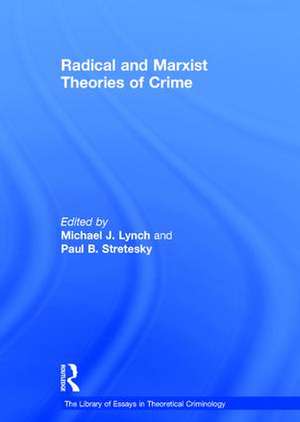Radical and Marxist Theories of Crime: The Library of Essays in Theoretical Criminology
Autor Paul B. Stretesky Editat de Michael J. Lynchen Limba Engleză Hardback – 28 sep 2011
Preț: 1586.38 lei
Preț vechi: 2204.33 lei
-28% Nou
Puncte Express: 2380
Preț estimativ în valută:
303.59€ • 315.78$ • 250.63£
303.59€ • 315.78$ • 250.63£
Comandă specială
Livrare economică 25 martie-08 aprilie
Doresc să fiu notificat când acest titlu va fi disponibil:
Se trimite...
Preluare comenzi: 021 569.72.76
Specificații
ISBN-13: 9781409423096
ISBN-10: 1409423093
Pagini: 546
Dimensiuni: 174 x 246 mm
Greutate: 1.28 kg
Ediția:1
Editura: Taylor & Francis
Colecția Routledge
Seria The Library of Essays in Theoretical Criminology
Locul publicării:Oxford, United Kingdom
ISBN-10: 1409423093
Pagini: 546
Dimensiuni: 174 x 246 mm
Greutate: 1.28 kg
Ediția:1
Editura: Taylor & Francis
Colecția Routledge
Seria The Library of Essays in Theoretical Criminology
Locul publicării:Oxford, United Kingdom
Cuprins
Contents: Introduction; Part I Definitions and Background: Social class and the definition of crime, Herman Schwendinger and Julia Schwendinger; From 'crime' to social harm?, Paddy Hillyard and Steve Tombs; Critical criminology and the critique of domination: the story of an intellectual movement, Raymond J. Michalowski; Toward a political economy of crime, William J. Chambliss; The value of quantitative analysis for a critical understanding of crime and society, Steven E. Barkan; Toward a Marxian theory of deviance, Steven Spitzer. Part II Varieties of Radical/Marxist Criminology: The tasks facing a realist criminology, Jock Young; The state of the criminology of crimes of the state, Dawn L. Rothe and David O. Friedrichs; Corporate violence against Canadian women: assessing left-realist research and policy, Walter S. DeKeseredy and Colin Goff; Rape, sexual inequality and levels of violence, Julia Schwendinger and Herman Schwendinger. Part III Explaining Crime: Class and the economics of crime, David M. Gordon; A cross-national test of Bonger's theory of criminality and economic conditions, Olena Antonaccio and Charles R. Tittle; A tale of two capitalisms: preliminary spatial and historical comparisons of homicide rates in Western Europe and the USA, Steve Hall and Craig McLean; The rate of surplus value and crime: a theoretical and empirical examination of Marxian economic theory and criminology, Michael J. Lynch, W. Byron Groves and Alan Lizotte; A critique of criminology: toward an integrated structural-Marxist theory of delinquency production, Mark Colvin and John Pauly; Delinquency and the age structure of society, David F. Greenberg; Poverty, inequality and youth violence, Ronald C. Kramer. Part IV Social Control: Policing and Punishment: Unemployment, imprisonment and social structures of accumulation: historical contingency in the Rusche-Kirchheimer hypothesis, Raymond J. Michalowski and Susan M. Carlson; The Buffalo police, 1872-1900: labor unrest, politi
Notă biografică
Michael J. Lynch is Professor in the Department of Criminology, University of South Florida, USA and Paul B. Stretesky is Associate Professor in the School of Public Affairs, University of Colorado, Denver, USA.
Recenzii
Michael J. Lynch, winner of the 2011 Lifetime Achievement Award from the Division on Critical Criminology, American Society of Criminology. ’...an interesting collection of papers, which gives the reader a good insight in how the strand of RMC has developed over time.’ Marx & Philosophy Review of Books
Descriere
Radical or Marxist criminology is an influential critique which emerged in the late 1960s and emphasizes how power inequality and structures, especially those related to class, affect the nature of crime, law and justice. The essays selected for this volume draw attention to the influence of structural forces, neglected crime and the ways in which law and criminal justice processes reinforce power structures and contribute to class control.











